Monday, May 24, 2010
2009/2010 Penguin Player Grades
It's that time of year again -- albeit much earlier this time around.
While the Pittsburgh Penguins focus on the upcoming NHL draft and free-agency -- and grit their teeth because their arch rival Philadelphia Flyers will battle Marion Hossa and the Chicago Blackhawks for the Stanley Cup this season -- the off-season brings the opportunity for those of us in the blogosphere to critically analyze each player's season-long performance. For me, that means revealing my much-anticipated yearly player grades.
As in prior seasons, my 2009/2010 grades are given based on each player's contribution when compared to what was reasonably expected during the season, and includes consideration of playoff performance.
There will be grades for every primary roster player on the team throughout the course of the year. That means if you were called up for a 2, 5 or even 10 game cup-of-coffee (read: Chris Conner, Mark Letestu, etc.), you won't find an evaluation of your play here, so you better seek out the Pens' coaching staff for that.
The grades also will be listed in order, from A on down, rather than by position. This, too, is consistent with my evaluations in prior years.
So, without keeping anyone on the edge of their seats any longer .....
SIDNEY CROSBY: Crosby was the Penguins' best player this season, and it's becoming awfully hard to come up with ways he can do more for the team. Before the year began, two of the things he was outspoken about wanting to improve upon were his face-off percentage and becoming a better goal-scorer. Check and check. Crosby became markedly better in the circle, winning about 56% of his draws, and won the Maurice "Rocket" Richard Trophy by finishing with a league-leading 51 goals, tying Tampa Bay Lightning wuderkind forward Steven Stamkos for the award. Crosby finished 2nd in league scoring overall this year with 109 points, 3 behind Vancouver Canucks forward Henrik Sedin. Crosby did struggle against the Montreal Canadiens in the second round of the playoffs, but it's hard to be critical of his post-season play after dominating the Ottawa Senators in the first round and still putting up 19 points in 13 games. Not only does Crosby remain the league's most popular and marketable commodity, he continues to be the biggest driving force behind the Penguins' success. A+
MATT COOKE: The fact that Cookie is the 2nd person on this list says a lot about the Pens' season, both bad and good. Bad in that a few of the other more notable Penguins' players aren't listed before him; good in that it shows how well Cooke played this season. Cooke's numbers weren't off the charts but his 15 goals and 15 assists (and 4 big playoff goals) are just about the perfect totals for a guy in his role on the 3rd line. Moreover, everyone knows that what Cooke has brought to the Penguins the last two seasons isn't just embodied in scoring statistics. Cooke plays a physical, abrasive style that complements the Penguins' other skilled players so well. He also is a really strong penalty killer and defensively responsible at even strength, as evidenced by his +17 rating this year. Cooke did so much so well for the Penguins this year that it's not hard to see why he's likely to get a meaningful raise on his 1.2 million dollar salary in unrestrictied free agency this summer. I just hope it's Pittsburgh that gives it to him. A-
PASCAL DUPUIS: Dupuis is another guy who exceeded most expectations this year. Falling just 2 goals shy of the 20-goal plateau, Dupuis demonstrated a better scoring acumen this year, while continuing to be a valuable and generally responsible player capable of filling in on any wing on any line. I would be hard pressed to find someone who was dissatisfied with very many parts of Duper's game this season. A-
BROOKS ORPIK: The Penguins' most physical and responsible defenseman this year, Orpik probably had the most consistent season of his career from game 1 to game 7 of the second round of the playoffs. Orpik also started adding a little offense to his game this year, putting up 25 points on the season. #44 again was one of the league's top hitters all season long, and provides a presence on the Penguins' blueline they just don't have in their other rearguards. He's also one of the team's better leaders in the locker room, and will always provide the real 'pulse' of the team when asked. A-
JORDAN STAAL: Staal has been one of the league's better defensive players ever since he came into the league 4 years ago, but only this year has his work attained full national recognition, which is what being a finalist for the Frank J. Selke Trophy as the league's best defensive forward will do. Staal's rock-like presence on the Penguins' 3rd line allows them to run deeper down the middle than any club in the league, and his ability to be an offensive contributor shouldn't be knocked either, as Staal tied a career high with 49 points this year on 21 goals and 28 assists. He had a little bit of a rough post-season (particularly in the first round) and finished with only 5 goals and an unusual -4 rating in 11 playoff contests, but he also demonstrated legendary toughness missing just two post-season games after undergoing what was expected to be season-ending surgery to repair a lacerated tendon on top of his right foot after game 1 of the second round. His upside is also the biggest underlying reason why trade rumors involving Evgeni Malkin are so prominent in these parts. B+
SERGEI GONCHAR: #55 is the Penguins' biggest off-season question headed into free agency, and what the team does with him will be something everyone watches in the next 35 days or so. Gonchar again missed time to injury this year (which has happened 2 seasons in a row now), but as I said in this space a few days ago, only two other blueliners scored at a point-per-game pace better than Sarge's this season. Finishing 6th among all defensemen in scoring with 50 points in 62 games is nothing to sneeze at. Gonchar also had 12 points in 13 playoff games for those who were paying attention. In all fairness, I don't believe Gonchar was as responsible in his own end this year as he was last season, but there's no mistaking that his primary value to the Penguins lies in creating offense. While there are mixed feelings in Penguin nation about whether Gonchar was a major reason why the Pens' power play struggled for a lot of the year, anyone who doesn't appreciate the subtle things he does to QB the triangle at the point for Pittsburgh needs to pay more attention. At 36, and after 5 years with the team, will he stay or will he go? I advocated for dealing Gonchar before the trading deadline last year but, at this point, the landscape is different. Personally, I'm hoping for 2 more seasons in Pittsburgh with him. B+
CRAIG ADAMS: Adams is a favorite of Pens' head coach Dan Bylsma and it's not hard to see why. He kills penalties well, is a great team guy, and plays a physical 4th line role for the club. He can't score a regular season goal to save his life (he's now gone over 100 games without one), but he does have 5 goals in the last 40 or so playoff games, which is no coincidence considering that his style of play is more valuable in the post-season than it is in the regular season. Adams was a nice waiver-wire pick-up before last year's Cup run who probably isn't going anywhere anytime soon. B
BILL GUERIN: I have to admit that the 39-year old Guerin gave me more than I expected this season. I anticipated his game falling off some, but his 21 goals and 45 points shoved that in my face, and the leadership he provided beyond those numbers made him even more valuable. But all that said, Guerin is at the year-to-year stage of his career, where his limitations can be seen almost as much as his strengths. His -9 this year despite playing on Crosby's line much of the season shows that he can be a bit of a defensive liability. He also isn't a great puck-retriever in the corner and along the wall any longer because he just can't get to the biscuit as quickly as he used to. Because it's hard to imagine him getting faster on the ice, Guerin is going to face questions about how much he really can contribute to the team every off-season until he retires, including this one. I expect the Penguins to bring the unrestricted free agent back for one more kick at the can in the opening season of Consol Energy Center, but the interesting thing to watch will be to see what Pittsburgh puts on the table for him money-wise. B
BRENT JOHNSON: Basically, teams with a #1 goaltender like the Penguins look for one main thing from their backup goaltender: keep the team competitive when you're between the pipes. With a 10-6-1 record, a 2.76 GAA and a 90.6 SV %, Johnson pretty much gave Pittsburgh everything they could have asked from him in that regard this season. It's also part of the reason Pens' GM Ray Shero didn't waste any time signing the veteran to a 2-year contract extension late in the season. He's a great complement to Marc-Andre Fleury, and I'm glad he's sticking around for a little while. B
MIKE RUPP: Rupp started off the season like gangbusters, shedding his role as a physical, 4th line checking forward good at dropping the mitts and instead exceeding his career high in goals by mid-season and looking like he could be a 20-goal scorer. But Rupp came back down to earth in the second half of the season and settled more into doing what he was brought here to do -- bang bodies and provide a presence. He's still an effective 4th liner who has hands that everyone now knows can do damage not just with his fists. B
MARK EATON: For the second straight season, Eaton was healthy most of the year, and his consistent performance on the ice reflects why Shero signed him to a 2-year deal a few years ago, despite coming off several injury-plagued seasons. There's nothing fancy about Eaton's game, as his 3 goals and 13 assists and +5 rating in 79 games attest, but that's exactly what Pittsburgh looks for from him. Like 7 other Penguin regulars, he's an unrestricted free agent this summer, and watching how Shero deals with that situation will be another one worth watching. Eaton's next contract will likely be his last meaningful payday in his career, but he probably feels some loyalty to Pittsburgh in light of the circumstances under which he signed his last deal. B
KRIS LETANG: Tanger has all the tools to be a star in the National Hockey League, but hasn't found a way to harness everything in his toolbox on a consistent basis yet. His numbers this season -- 3 goals and 24 assists -- were below what he's capable of, but his 5 goals from the backline in only 13 post-season constests shows what he can do when he puts his mind to it. Letang needs to be sure he puts his mind to everything, though, because while he was an impact player for Pittsburgh in the playoffs, it wasn't always because he was producing offense, as his -5 rating and 14 post-season giveaways attest. Despite that, Letang has shown in the past that he can be a strong defensive and physical presence of the Penguins on the blueline -- he just needs to bear down with his focus level more. Letang is still pretty young and will probably be around these parts for a while after signing a new contract late this season, but if Pittsburgh doesn't bring back Sergei Gonchar in 2010/2011, he's going to have to grow up in a hurry for the Penguins next year. B-
JORDAN LEOPOLD: Leopold was a late addition to the team after being acquired in a deal from the Florida Panthers for a 2nd round pick before this season's trade deadline. It took several games for Leopold to get his feet wet, but once he did, his skills in the transition game in Bylsma's system took over, and he was on a pretty hot goal-scoring streak for a blueliner as the playoffs began. In fact, I identified him as a big potential difference maker for the Penguins going into the post-sesason. Unfortunately, that was before Ottawa Senators' defenseman Andy Sutton shelved him for more than 2 weeks with a concussion in game 2 of the second round, and Leopold wasn't the same player when he returned. Because of his short tenure in Pittsburgh, the book on him as a Penguin isn't really complete. When healthy, he can put up 30 or so points a year and be fairly sound in his own end. He was paid a reasonable 1.75 million dollars last year but as an unrestricted free agent and with the Pens' defensive plans uncertain right now, it's hard to say whether or not he'll be back. C+
CHRIS KUNITZ: Kunitz had the type of regular season we probably should have expected at this point of his career -- 13 goals, 32 points, and only 50 games played due to various ailments. Given his physical style, there's simply always the risk of #14 missing time. Kunitz was one of the Penguins' better players in the post-season, though, scoring 4 goals and 11 points in 13 games and using his punishing forechecking to create space and wear down opposing blueliners. If he could bring that play consistently during the regular season, it would make the 3.5 million dollars he's getting paid easier to swallow. As it is, on a team with little cap space, it's easy to feel that Kunitz isn't always pulling his weight for a guy who plays regularly on the wing with the best center in the game. If Kunitz can stay healthy and up his production to the 25 goal and 60-65 point level, his grade will go up next year. As it is, he's middling around average. C+
MARC-ANDRE FLEURY: Fleury's record in the regular season, 37-21-6, probably suggests an above average year. However, his other, more individual statistical numbers -- a 2.67 GAA and a 90.5 SV% -- dropped this year. Worse, Fleury regressed from a consistency standpoint. From January on, he wasn't able to string together several weeks of strong play. Unfortunately for Pittsburgh, that continued in the post-season, when he may have demonstrated his overall worst playoff performance as a Penguin. His SV % in the post-season was only 89.1 and, while Fleury finally was a main factor in the Penguins winning a few games in the second round (which he wasn't in round 1), he was significantly below average in several of their losses. He let up several soft (and early) goals and, unlike the guy we saw through most of the last two playoff runs here in Pittsburgh, didn't give his struggling teammates enough of a chance to stay in several games. Goaltending is so crucial in the playoffs and, because of that, it isn't a stretch to say that Fleury's step back this year might have been the biggest contributing factor to the Penguins' 2nd round playoff exit. He clearly needs to up his play next season. C
EVGENI MALKIN: The fact that Malkin and Fleury are so far down this list says everything about why I'm even preparing this piece now instead of talking about what could have been an exhilarating Stanley Cup Final between the Pens' and Blackhawks. By everyone's account, Malkin had a sub-par offensive season, with only 28 goals and 77 points just one year after putting up about 35 more points and not only winning the Art Ross Trophy as the league's leading regular season scorer, but also the Conn Smythe Trophy as the playoff MVP. Worse, Geno was not much better in this year's post-season. He did have 11 points in 13 games and showed flashes of brilliance but, for the most part, was a non-factor at even strength against both the Senators and Montreal Canadiens. Malkin still seems to brood and get down on himself unnecessarily at times and, at 24 years old now, he has to start growing out of that. Consistency wasn't an issue for him before this season, but it is now. C
ALEX GOLIGOSKI: Goligoski was another guy that started off the season like gangbusters this year, and looked like a rearguard who would finish in the top 5 in the league in scoring at his position. After he was hurt in November, he never was the same player. When he returned, he struggled to put up points at the same clip and his confidence took a tumble. He finished with 8 goals and 37 points in 69 games -- and still was a +7 -- but after seeing a glimpse of what he was capable of, it's hard not to look at his season as somewhat of a disappointment for him. His 9 points in 13 playoff games was a decent contribution, but there's still more Goligoski can do. Like Letang, he may have to take a big step forward next year if Sergei Gonchar doesn't re-sign with the team. C
JAY McKEE: McKee was relatively dependable for the Penguins this year. He's a good shot blocker and solid penalty killer -- two valuable traits -- but his limitations beyond that take away from how good he is in those areas. Overall, he wasn't as much of an impact player as I felt he could have been. He was a bargain this year salary-wise because of a buyout payment he was receiving from his former team, the St. Louis Blues. As an unrestricted free-agent who will probably comman more on the market -- and with Ben Lovejoy knocking down the door -- he'll likely leave Pittsburgh. C
ERIC GODARD: There's nothing new to say about Godard that I didn't say about him last year in this space. He's a physical 4th liner who does what he does well --- dropping the mitts -- and keeps other teams honest in the process. In the regular season, he kept his worth. In the post-season, he didn't play a game for the 2nd straight year. With Rupp on the roster, I think it's only a matter of time before the Penguins' give Godard's roster spot to a guy on the farm. C
TYLER KENNEDY: TK was another guy who missed time this year with an injury, and despite word in training camp that he was a viable candidate to take on more of a scoring role and perhaps move up from his well-played 3rd line position to the 2nd line with Malkin, Kennedy was never really able to make a meaningful offensive impact this year. He finished with a disappointing 13 goals, well shy of the 20 he should put up and the 25 many people think he's capable of scoring. Perhaps it's about time everyone rethink their position about that? Worse, Kennedy's problems this year went beyond putting the puck in the net. He was a healthy scratch for a few games and not doing enough of what he does best on the ice when he was in the lineup -- using his speed, banging bodies, and creating off the forecheck. Next year is a big season for Kennedy. If he doesn't improve, he could lose his spot on what many commonly feel is one of the best 3rd lines in hockey. C-
ALEXEI PONIKAROVSKY: Ponikarovsky was this year's big trade-deadline addition and, with a history of consistent 20-goal seasons under his belt on consistently below-average Toronto Maple Leaf teams, it was hard not to be excited about what he was capable of bringing to Pittsburgh's top-6 forward group, despite the fact that Pens' GM Ray Shero gave up one of his better wing prospects in Luca Caputi to get him. After about 15 regular season games and 13 playoff games, though, it's fair to say that what Poni gave the Penguins after being acquired didn't meet expectations. While he racked up some helpers, he only scored 2 regular season goals with the team (which included one in his first game after being acquired), and topped that by scoring only 1 in the post-season while being a healthy scratch for two games. Common wisdom suggests that the unrestricted 6' 4" ukranian free agent won't sign a contract with the Penguins and, while I think that result is probably more likely than not because I suspect there will be plenty of other teams willing to give him a chance, I think Shero will at least kick the can with him and explore the possibility of bringing him back. As it is, though, what the Penguins got from Poni after they dealt for him can only be considered a disappointment. D+
MAX TALBOT: Talbot is another guy who had a real tough season. The year started with the 2009 Stanley Cup hero on the shelf still recovering from off-season shoulder surgery and, when he did come back after missing 20 or so games, he was unable to get on track before being hurt again and missing time with a groin injury, among other ailments. Overall, Talbot played 45 games and scored only 7 points. He also was +9. On the bright side, he did show more of his big-game persona in the post-season, scoring 6 points in 11 games. Considering everything, however, this season has to be a disappointment for him, too. He continues to be a valuable role player and team guy for Pittsburgh, though, and I'm sure he can't wait to start fresh next season. D+
RUSLAN FEDOTENKO: Speaking of disappointments, Rusty was the Penguins' biggest. He scored 11 goals in 80 games and earned his -17 rating for the year honestly. Worse, the hope that he would raise his game in the playoffs -- as he did last year and as he had a history of doing -- didn't materialize either. Part of that was because he had been playing so poorly, he couldn't even get in the post-season lineup, but part of it was demonstrated when he didn't put up a single point and was a -3 in the 6 games he did play. I'm 110% certain he won't return next year. D-
That's it boys and girls. It's interesting to compare these grades to my end-of-season grades last year. When you do, you can see the differences, mainly in terms of how many grades there are at C and below this year (11, vs. 4 last season), and in the fact that two of the Penguins 3 most important players (Malkin and Fleury) received grades at that level this season. That's simply not good enough - and it dovetails with Pittsburgh's early exit from the playoffs this post-season. Needless to say, the team as a whole has to be better next year.
The betting here is that they will.
More soon.
Subscribe to:
Post Comments (Atom)






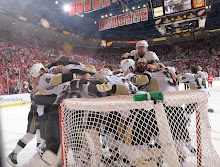
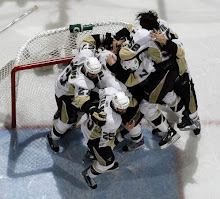

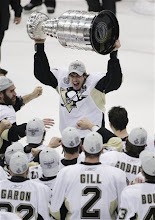
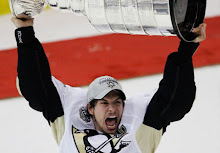
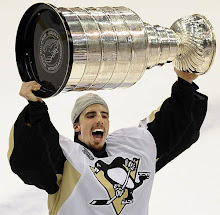

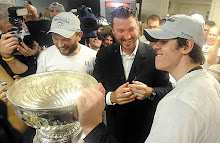
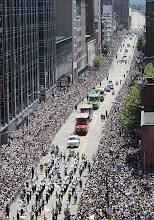



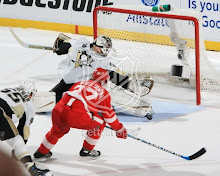
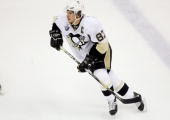
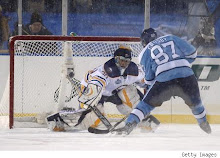
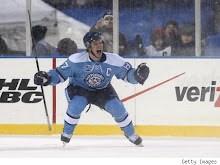
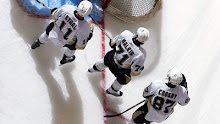

No comments:
Post a Comment